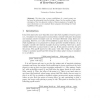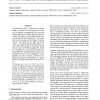570 search results - page 1 / 114 » On the number of zero-sum subsequences |
CG
2006
Springer
13 years 8 months ago
2006
Springer
We show that a proper equilibrium of a matrix game can be found in polynomial time by solving a linear (in the number of pure strategies of the two players) number of linear progra...
AAAI
2007
13 years 7 months ago
2007
In timed, zero-sum games, the goal is to maximize the probability of winning, which is not necessarily the same as maximizing our expected reward. We consider cumulative intermedi...
ARSCOM
2007
13 years 5 months ago
2007
For any h ∈ N, a graph G = (V, E) is said to be h-magic if there exists a labeling l : E(G) → Zh − {0} such that the induced vertex labeling l+ : V (G) → Zh defined by l+ ...
ICML
2003
IEEE
14 years 5 months ago
2003
IEEE
We present BL-WoLF, a framework for learnability in repeated zero-sum games where the cost of learning is measured by the losses the learning agent accrues (rather than the number...
AAAI
2007
13 years 7 months ago
2007
In normal scenarios, computer scientists often consider the number of states in a game to capture the difficulty of learning an equilibrium. However, players do not see games in ...


